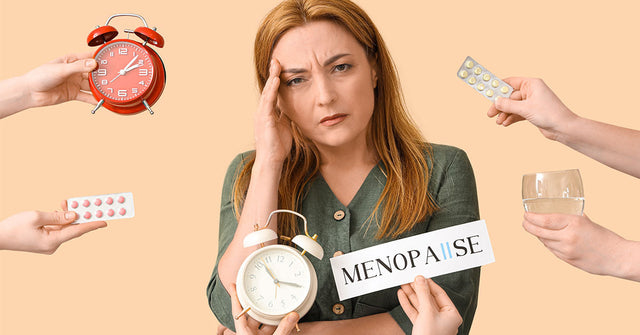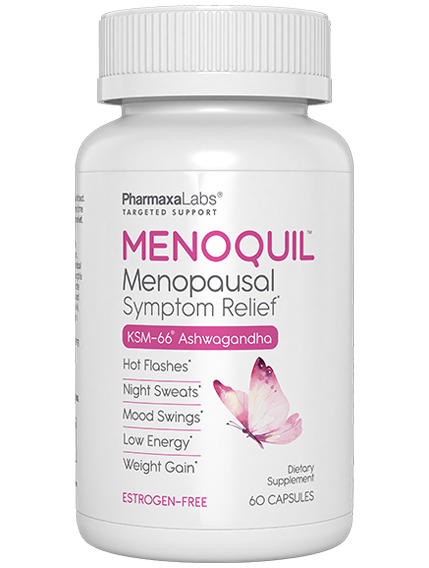Postmenopause: Causes, Symptoms, and what to Expect

Introduction
Postmenopause marks a new chapter in a woman’s life after she has gone 12 consecutive months without a menstrual period. This stage brings unique physical changes and health considerations, impacting everything from bone health to mood. For many, it can be a time of freedom from menstruation, though it may also introduce new challenges, like maintaining bone density and adjusting to lower hormone levels. This guide explores postmenopause, examining how it differs from other stages of menopause, common symptoms, potential causes, and natural remedies to help manage the transition.
About Postmenopause
Postmenopause is the phase following menopause, lasting the rest of a woman’s life after she has completed the menopause transition. The postmenopausal stage signifies that the ovaries have largely ceased producing hormones, specifically estrogen and progesterone. This hormonal shift can lead to various changes in the body, impacting areas like metabolism, bone health, and cardiovascular function. While symptoms like hot flashes may diminish over time, the postmenopausal phase brings an increased focus on long-term health, including preventive care against osteoporosis and heart disease.
As estrogen levels remain low, women are at higher risk for certain conditions, such as postmenopausal osteoporosis and heart issues, making it essential to stay informed and proactive about health choices during this phase.
Postmenopause vs. Menopause
To understand postmenopause, it helps to differentiate it from other stages of menopause. Menopause refers to the moment when a woman has not experienced a menstrual period for 12 consecutive months, officially ending her reproductive years. In contrast, postmenopause is the stage following this period, where symptoms and health needs may change. During menopause, symptoms like hot flashes, night sweats, and mood changes are more intense, as the body undergoes hormonal fluctuations. However, in postmenopause, while some of these symptoms may lessen, risks for conditions like osteoporosis and heart disease increase due to consistently low estrogen levels.
Understanding these stages helps in preparing for postmenopause with a focus on long-term health, particularly by managing weight, maintaining a balanced diet, and monitoring bone and heart health.
Average Age of Postmenopause
The average age for entering postmenopause is around 51 years, though it can vary widely. Menopause itself typically occurs between ages 45 and 55, with some women entering earlier or later. After completing the menopause transition, a woman is considered postmenopausal. It’s important to note that while age can be an indicator, factors like genetics, lifestyle, and certain medical treatments can influence the timing of menopause and, consequently, the onset of postmenopause.
Recent research on postmenopause reveals the health impacts of prolonged low estrogen levels, particularly for cardiovascular and bone health. A study by the American College of Cardiology found that postmenopausal women experience accelerated plaque buildup in their arteries, increasing the risk of heart disease. For example, women with moderate calcium buildup at the start of the study had nearly double the rate of plaque progression compared to men, highlighting the need for heightened cardiovascular monitoring postmenopause.
In terms of bone health, studies indicate a sharp increase in osteoporosis risk due to decreased estrogen levels. Research from the British Menopause Society emphasizes the importance of calcium, vitamin D, and structured exercise to help manage bone density loss in postmenopausal women. Lifestyle interventions, along with selective medications for high-risk individuals, are shown to reduce fracture risks and improve long-term outcomes.
These findings underscore the importance of regular health screenings and proactive care during postmenopause, including cardiovascular assessments and bone density checks. For more detailed insights, refer to the American College of Cardiology and British Menopause Society studies.
Postmenopause Causes
Postmenopause is primarily caused by a natural, internal decline in hormone production, particularly estrogen and progesterone, from the ovaries. However, both internal and external factors play roles in shaping the physical changes women experience during this phase, especially concerning metabolism, bone health, and post-menopause weight loss.
Internal Factors
- Hormonal Changes: The ovaries significantly reduce estrogen and progesterone production after menopause, affecting processes like metabolism, bone density, and fat distribution. Estrogen, in particular, plays a key role in regulating fat storage, so its absence can lead to slower metabolism and increased body fat, often around the abdomen. This hormonal shift makes postmenopause weight loss challenging as the body’s ability to burn calories decreases.
- Genetics: Genetic factors can influence the timing of menopause and the degree of postmenopausal symptoms. For instance, family history can affect bone density loss rates and cardiovascular risks, both of which become prominent postmenopause due to lower estrogen levels.
- Bone Density and Muscle Loss: Reduced estrogen also leads to a decline in bone density and muscle mass. Since muscle burns more calories than fat, this reduction can slow metabolic rates and make it harder to achieve post-menopause weight loss.
External Factors
- Diet and Nutrition: Postmenopausal women may find it harder to lose weight without adjustments to diet. A diet low in essential nutrients like calcium, vitamin D, and lean protein can exacerbate bone density loss and muscle reduction. To support post-menopause weight loss and overall health, diets rich in vegetables, whole grains, lean proteins, and healthy fats are recommended.
- Physical Activity: Regular physical activity, particularly weight-bearing and resistance exercises, supports bone density and maintains muscle mass. Studies show that postmenopausal women who engage in strength training and aerobic exercise have better success with weight management and reducing the risk of osteoporosis.
- Environmental Factors: Lifestyle choices, such as smoking and excessive alcohol consumption, can compound health risks postmenopause. Smoking, for example, is linked to lower estrogen levels, accelerating bone density loss. Similarly, high alcohol intake can lead to weight gain and increase cardiovascular risks.
- Stress and Sleep Patterns: Postmenopausal women may experience increased stress due to lifestyle or hormonal shifts. Chronic stress elevates cortisol levels, which can contribute to abdominal weight gain. Sleep disturbances, common during postmenopause, also affect weight regulation by impacting metabolism and appetite regulation.
Postmenopause Symptoms
During postmenopause, symptoms related to menopause may lessen in severity, but new symptoms may arise due to the ongoing low levels of estrogen. Common postmenopausal symptoms include:
- Hot Flashes and Night Sweats: While often milder than during perimenopause or menopause, hot flashes can still occur, making it uncomfortable, especially at night.
- Postmenopausal Bleeding: Any bleeding after menopause is generally abnormal and should be checked by a healthcare provider, as it could indicate underlying health issues, including endometrial changes.
- Postmenopausal Osteoporosis: With estrogen's protective effect on bone density gone, the risk of osteoporosis increases, which may lead to fractures or bone loss if not managed.
- Vaginal Dryness and Discomfort: Low estrogen can lead to reduced lubrication and thinning of vaginal tissue, often resulting in discomfort during intercourse.
- Increased Risk of Cardiovascular Disease: Estrogen supports heart health, so its absence elevates the risk of heart-related issues, making heart-healthy practices essential during postmenopause.
Understanding these symptoms and addressing them through lifestyle and medical support can help women maintain a good quality of life during postmenopause.
You May Also Like to Read: Premenopause: Signs, Symptoms, and What to Expect
Postmenopause Treatments
Managing symptoms and supporting health during postmenopause involves a combination of medical treatments and lifestyle adjustments. Here are some common approaches:
- Hormone Therapy: Although not suitable for everyone, hormone replacement therapy (HRT) can help alleviate symptoms like hot flashes and support bone health. However, it’s typically only recommended under medical guidance, as it may carry certain risks.
- Lifestyle and Diet Adjustments: A nutrient-rich diet with plenty of calcium and vitamin D is crucial for bone health, while heart-healthy fats, whole grains, and lean proteins support cardiovascular health. Regular exercise, particularly weight-bearing activities like walking and strength training, can help maintain bone density and aid in weight management.
- Natural Remedies for Hot Flashes: For those preferring non-hormonal options, natural remedies can be effective. Herbal supplements such as black cohosh, evening primrose oil, and red clover may help reduce hot flashes, though it’s wise to consult a healthcare provider before starting any supplement. Additionally, practicing mindfulness, yoga, and relaxation techniques can assist in managing symptoms.
- Vaginal Moisturizers and Lubricants: These products can relieve vaginal dryness and discomfort without the need for hormones, making them an accessible option for postmenopausal women.
- Regular Health Screenings: Ensuring routine screenings, like bone density tests and cardiovascular assessments, can help detect and manage any health risks associated with postmenopause early on.
- Mental Health Support: As hormonal shifts can influence mood and energy levels, support from therapy or counseling can be beneficial. Engaging in hobbies, connecting with friends, and practicing self-care also contribute positively to mental well-being.
Postmenopause - Frequently Asked Questions
Takeaway
Postmenopause brings about changes that require attention to long-term health, particularly concerning bone density, cardiovascular health, and hormone balance. While some menopausal symptoms lessen, the shift in hormone levels can create new challenges. Staying informed, incorporating supportive lifestyle choices, and working with healthcare providers can help manage this phase effectively, leading to a healthy and fulfilling postmenopausal life.









